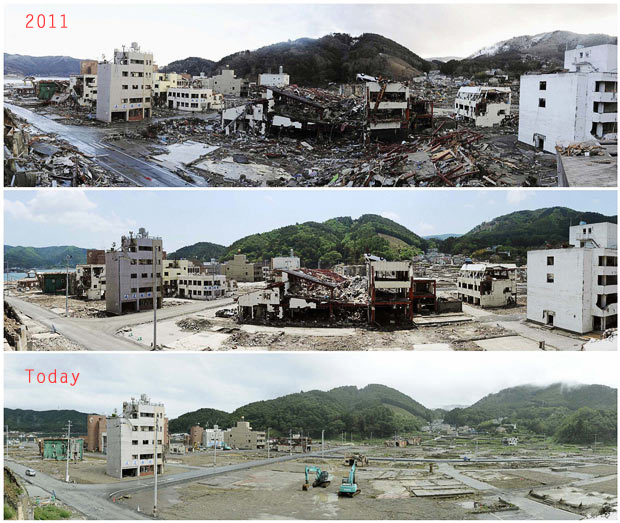Record-high land prices in Japan’s Northeastern Region.
 After the devastating earthquake and the tsunami that hit the Northeastern Region in March last year, land prices have gone up, due to the spurring housing demand. The rise is most visible in the Miyagi prefecture, which was damaged by the tsunami. Demand rose for real estate located inland or at a higher altitude, with most gains for owners in theShirasagidai area in the city of Ishinomaki, where prices went up with 61 percent to 22,500 yen ($269) per square meter.Yet, in Urayasu, the home of the Tokyo Disneyland resort in Chiba prefecture, residential land prices declined.
After the devastating earthquake and the tsunami that hit the Northeastern Region in March last year, land prices have gone up, due to the spurring housing demand. The rise is most visible in the Miyagi prefecture, which was damaged by the tsunami. Demand rose for real estate located inland or at a higher altitude, with most gains for owners in theShirasagidai area in the city of Ishinomaki, where prices went up with 61 percent to 22,500 yen ($269) per square meter.Yet, in Urayasu, the home of the Tokyo Disneyland resort in Chiba prefecture, residential land prices declined.
The most expensive piece of residential property is in Rokubancho in Chiyoda ward, where the Imperial Palace is located, with price amounting to 2.78 million yen per square meter. Marunouchi Building, also in Chiyoda ward, and a patch in Ginza’s shopping district, were the priciest commercial pieces of real estate at 27 million yen per square meter.
The Japanese Ministry of Land, Infrastructure, Transport and Tourism has to rebuild more than 1 million homes with 20 trillion yen in relief spending.Nationwide land-prices decline, with the pace slowing down to 2.6 percent from 3 percent in 2011.Land prices in Tokyo’s bayside neighborhoods, where apartments were built on reclaimed land, fell with around 15 percent after the earthquake turned some of the landfill into mud, shattered pipes and severed water supplies. Yet, demand in metropolitan areas including Tokyo grows stronger.
The globaleconomic recovery and rebuilding demandgives hope to experts that Japan’s economy will grow stronger in the next two years. They expect land-prices’declineto ease even further nationwide, except for the areas that were the hardest hit, on the back of economic expansion.
According to the Ministry’s annual land price report the decline in residential and commercial land prices is slowing down, with respectively 2.3 percent fall in 2011 compared to 2.7 percent in 2010 for the first and 3.1 percent in 2011 compared to 3.8 percent drop in 2010 for the second type. Prices are stabilizing in the biggest metropolitan areas as well with a drop of 1.5 percent last year, compared with the 2 percent fall in 2010.
There have been unexpected gains in parts of Miyagi prefecture for the rebuilding demand in the area. Those are not due to fraud or speculations, but rather because of the high real demand and the vast number of people relocating.
Domaza - Properties

